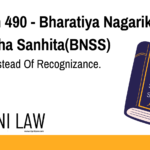Code: Section 494 BNSS
When the person required by any Court, or officer to execute a bond is a child,
such Court or officer may accept, in lieu thereof, a bond executed by a surety or sureties
only.
Explanation of Section 494 BNSS
Section 494 of the Bharatiya Nagarik Suraksha Sanhita (BNSS) addresses the situation when a child is required to execute a bond.
Key Points:
- Child’s Bond Requirement: In cases where a child is required to execute a bond, the Court or officer may not require the child to personally provide the bond.
- Surety Bond: Instead, the Court or officer may accept a bond executed only by sureties (i.e., responsible individuals who will take the financial responsibility for the child’s actions in case of default).
- Purpose: This provision acknowledges that children may not have the legal or financial capacity to execute a bond on their own, thus relying on a surety to assume responsibility.
This ensures that children are not unfairly burdened with legal or financial obligations they cannot meet, while still upholding the legal requirements of the bond.
Illustration
Example 1: Child Required to Execute a Bond
Scenario: A child is required to appear in Court for a minor offense and must execute a bond as part of the conditions for their release.
What Happens: Since the child cannot execute the bond themselves due to their age or financial limitations, the Court accepts a bond executed by one or more sureties (responsible adults who agree to take financial responsibility if the child fails to comply with the conditions).
Example 2: Court Requires Sureties for a Child
Scenario: A child is summoned by a Court but lacks the legal capacity to execute a bond.
What Happens: The Court allows sureties to execute the bond in place of the child. The sureties are held responsible for ensuring the child meets the requirements of the bond.
Common Questions and Answers on Section 494 BNSS
1. Can a child execute a bond under Section 494 BNSS?
- Answer: No, a child cannot personally execute a bond. The Court or officer will allow the bond to be executed by sureties on behalf of the child.
2. Who can act as sureties for a child’s bond?
- Answer: The sureties are typically responsible adults, such as parents, guardians, or other individuals who agree to take financial responsibility for the child’s compliance with the bond.
3. Why is Section 494 BNSS important?
- Answer: This provision ensures that children are not unfairly burdened with legal or financial responsibilities. It allows responsible adults to act on behalf of the child, ensuring that legal processes are still followed while taking into account the child’s age and financial situation.
4. What happens if the surety fails to fulfill the bond conditions?
- Answer: If the surety fails to fulfill the conditions of the bond, the surety may be held liable for the child’s actions or default in accordance with the terms of the bond.
Conclusion
Section 494 of the Bharatiya Nagarik Suraksha Sanhita (BNSS) provides an important safeguard for children involved in legal proceedings. It allows sureties to execute bonds on behalf of the child, acknowledging that minors do not have the legal or financial capacity to do so themselves. This provision ensures that children can comply with legal requirements without being unfairly burdened, while still maintaining the integrity of the legal process.










